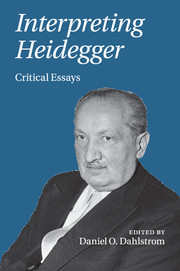Book contents
- Frontmatter
- Contents
- List of contributors
- Acknowledgments
- Method of citation and bibliography of Heidegger's works
- Introduction
- I Interpreting Heidegger's Philosophy
- II INTERPRETING HEIDEGGER'S INTERPRETATIONS
- 6 Being at the beginning: Heidegger's interpretation of Heraclitus
- 7 Being-affected: Heidegger, Aristotle, and the pathology of truth
- 8 Heidegger's interpretation of Kant
- 9 The death of God and the life of being: Heidegger's confrontation with Nietzsche
- 10 Heidegger's poetics of relationality
- III INTERPRETING HEIDEGGER'S CRITICS
- Index
- References
7 - Being-affected: Heidegger, Aristotle, and the pathology of truth
Published online by Cambridge University Press: 11 April 2011
- Frontmatter
- Contents
- List of contributors
- Acknowledgments
- Method of citation and bibliography of Heidegger's works
- Introduction
- I Interpreting Heidegger's Philosophy
- II INTERPRETING HEIDEGGER'S INTERPRETATIONS
- 6 Being at the beginning: Heidegger's interpretation of Heraclitus
- 7 Being-affected: Heidegger, Aristotle, and the pathology of truth
- 8 Heidegger's interpretation of Kant
- 9 The death of God and the life of being: Heidegger's confrontation with Nietzsche
- 10 Heidegger's poetics of relationality
- III INTERPRETING HEIDEGGER'S CRITICS
- Index
- References
Summary
To suffer is not a simple term.
Aristotle, De anima, 417b2Now there is something which is opposed to having as the imperfect is opposed to the perfect, and this is affection.
Aquinas, Commentary on De animaBeginning with a precursory reading of Franz Brentano's On the Manifold Meaning of Being according to Aristotle in 1907, Heidegger's interpretation of Aristotle always remained attuned to the question concerning the meaning of being (Sinn von Sein). Throughout the early Freiburg and Marburg period, Heidegger consistently returned to Aristotle's definition of the soul to investigate the meaning of being as the “being” of life. The human soul as a cause and principle of life that is open to the being of entities other than itself by its potential to perceive (to aisthanesthai) and to think (to noein) exhibits a fundamental receptivity to being-affected (paschein ti) by the world. However, this receptivity is not merely passive, but actively discloses the being of everything that appears; “the human soul is in a certain way all entities” (he psyche ta onta pos esti panta). In the following essay, after reviewing how Heidegger's interpretation of “being true” is grounded in the soul's manner of “being disposed,” I address his appropriation of Aristotle's account of the two basic forms of pathos, namely, the tranquil mood of “being composed” and the fearful mood of “being decomposed,” and, finally, how this pathology of truth “de-poses” us.
Keywords
- Type
- Chapter
- Information
- Interpreting HeideggerCritical Essays, pp. 156 - 173Publisher: Cambridge University PressPrint publication year: 2011



